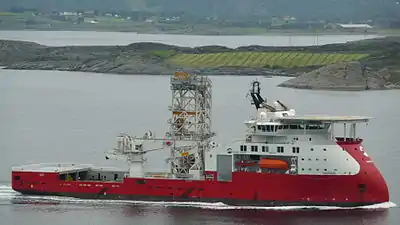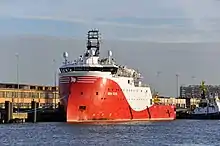Inverted bow
In ship design, an inverted bow (occasionally also referred to as reverse bow) is a ship's or large boat's bow whose farthest forward point is not at the top. The result may somewhat resemble a submarine's bow. Inverted bows maximize the length of waterline and hence the hull speed, and have often better hydrodynamic drag than ordinary bows. On the other hand, they have very little c and tend to dive under waves instead of piercing or going over them.




_at_night.jpg.webp)
Inverted bows were popular on battleships and large cruisers in the early 20th century. They fell out of favour, as they were very wet at high speeds and in heavy seas, but have made a comeback on modern ship design.
Examples
Motor Yacht "A"
The 390 ft luxury motor yacht M/Y "A" has an inverted bow, along with a tumblehome hull design.
Ulstein X-Bow
The Ulstein X-Bow (or just X-BOW) is an inverted ship's bow designed by Ulstein Group to improve handling in rough seas, and to lower fuel consumption by causing less hydrodynamic drag.[1] It is shaped somewhat like a submarine's bow.[2]
The MV Bourbon Orca, design AX104, is an Ulstein A-Series anchor handling tug supply vessel (AHTS) built for Bourbon Offshore Norway, the Norwegian division of the French Groupe Bourbon,[3] and was the first ship built with the Ulstein X-bow in 2006. She was awarded Ship of the Year 2006, both by Skipsrevyen[4] and Offshore Support Journal. In 2007, the Bourbon Orca design model was included in the London Science Museum's display of innovative technology. The vessel's operator claims that the design achieves higher speed and a calmer motion in head, rough seas.[5]
The Ulstein Verft yard has also constructed two vessels[6] featuring the X-Stern,[7] a similar shape for the stern, these two vessels being offshore wind power service vessels for Siemens Wind Power.[8] In 2015, the X-STERN was awarded the Next Generation Ship Award.[9] The first of the two ships, is servicing the Gemini offshore wind farm.[10][11]
In 2017, a US cruise company ordered four X-Bow cruise ships for arctic ice conditions,[12] and Lindblad Expeditions/National Geographic also ordered X-BOW expedition cruise vessels.[13]
As of 2018, more than 100 X-Bow vessels have been ordered,[14] ranging from offshore oil & gas and offshore wind vessels to exploration cruise vessels and yachts.[15]
Zumwalt-class destroyer
The bow of the Zumwalt-class stealth guided missile destroyer for the United States Navy is also inverted. It has a wave-piercing tumblehome hull form whose sides slope inward above the waterline.[16]
See also
References
- Five (TV channel) television program Megastructures, 12.45 to 1.45 pm Friday 29 January 2010
- http://www.thehandandeye.com/blog/2-2-2015-x-bow-innovating-an-old-industry
- Ship Of The Year 2006. Accessed: 24 January 2015.
- http://ulstein.com/news/2006/2006-ahts-bourbon-orca-ship-of-the-year 2006: AHTS Bourbon Orca - Ship of the Year
- A series of four Ulstein designed inverted bow PSV vessels page 16-17 Bourbon (company), 24 June 2010. Accessed: 11 March 2011.
- Ulstein to build two offshore service vessels green4sea, 14 January 2015.
- http://ulstein.com/innovations/x-stern/
- "WINDEA TBN1". Ulstein Group. Archived from the original on 12 March 2018. Retrieved 28 April 2016.
- http://www.offshoreenergytoday.com/ulsteins-x-stern-wins-next-generation-ship-award/
- "First offshore wind service vessel from Ulstein Verft launched". Offshore Wind Industry. Retrieved 28 April 2016.
- Tore Stensvold. "Første skip med X-Stern er kommet til Ulsteinvik". Teknisk Ukeblad. Retrieved 28 April 2016.
- http://www.seatrade-cruise.com/news/news-headlines/sunstone-china-group-to-build-4-6-expedition-cruise-ships.html
- http://www.seatrade-cruise.com/news/news-headlines/it-s-official-lindblad-inks-newbuild-deal-with-ulstein.html
- X-Bow cracks 100 vessels mark Offshore Wind Industry, 16 January 2015. Accessed: 18 January 2016.
- Ulstein X-Bow five years – overwhelming response from users ShipPedia, 22 December 2010. Accessed: 11 March 2011.
- "Full Page Reload". IEEE Spectrum: Technology, Engineering, and Science News. Retrieved 2020-11-10.
_at_Sorrent_2012_3.jpg.webp)